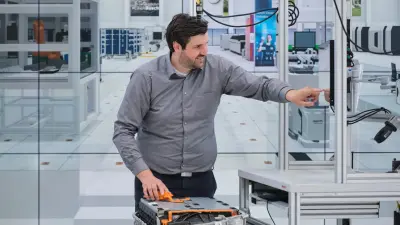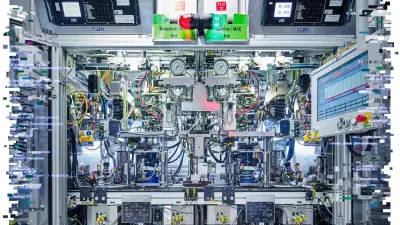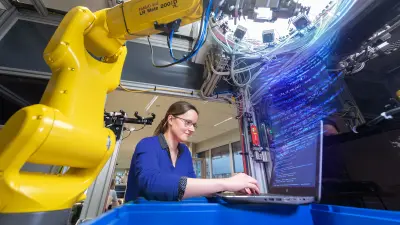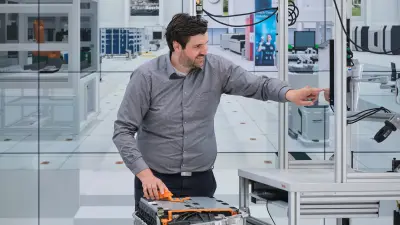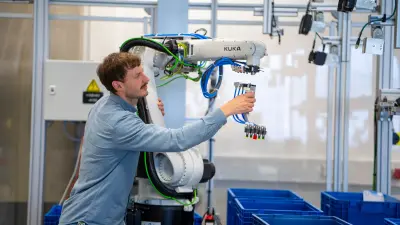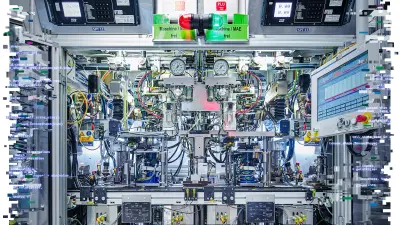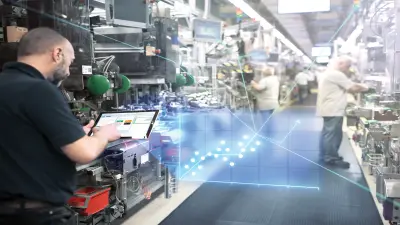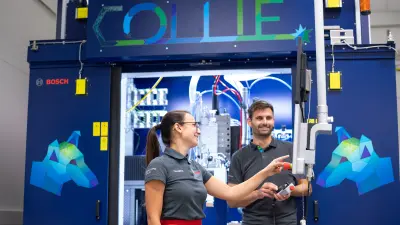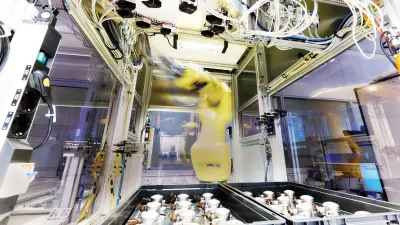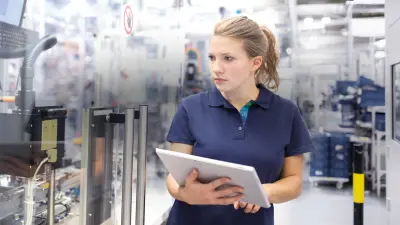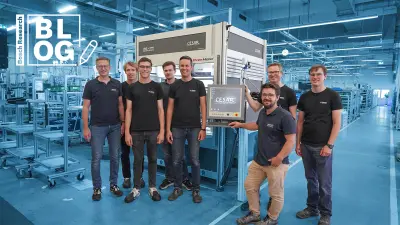Innovations for Industry 4.0
Bosch Research develops IT infrastructures and production systems for industrial automation.
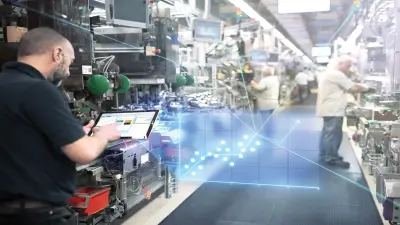
Ideally, industrial production should be quick, agile and cost-effective. In economically and politically uncertain times and in a volatile global environment, this goal is by no means easy to achieve. Companies must produce goods more flexibly and require even better control and networking across supply chains. What helps: a production planning system based on artificial intelligence (AI) along the supply chain as well as fault analysis and troubleshooting that works with real-time data. But there are other challenging questions too: how can factories be designed to cope with current and future requirements on the way to Industry 4.0 and how can production become more adaptable? At Bosch Research, we are coming up with answers to these pressing questions. Our experts develop software for the smart factory as well as versatile production systems and solutions for using artificial intelligence in production, for optimizing process chains and for making quality assurance in the Factory of the Future even more efficient.
Bosch Research benefits from the full range of services provided by its globally active parent company: from component manufacture, mechanical engineering and software to factory operation — many key competences are already part of the Bosch portfolio. New applications can even be tested in the Factory of the Future at one of more than 240 Bosch production sites worldwide. Bosch thus uses and supplies industrial automation solutions from a single source — from research and advance development to the finished production system.
On the cutting edge with the smart factory
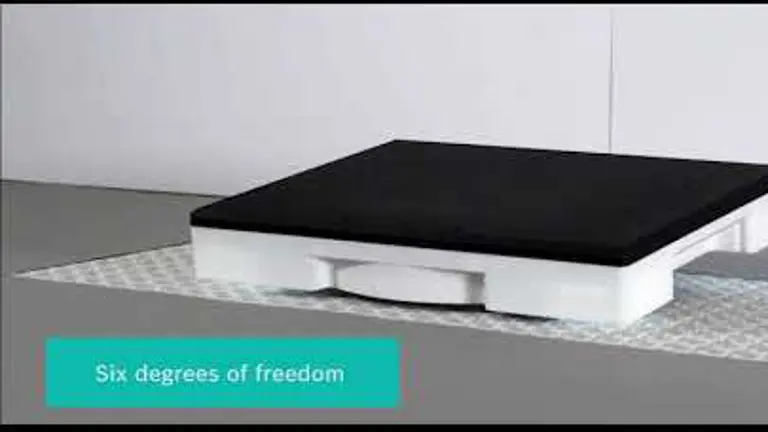
Loading the video requires your consent. If you agree by clicking on the Play icon, the video will load and data will be transmitted to Google as well as information will be accessed and stored by Google on your device. Google may be able to link these data or information with existing data.
The potential of hovering: planar robots are much more versatile than a conveyor belt — ideal for flexible manufacturing in sectors such as semiconductor production.
The trend in the Industry 4.0 smart factory is moving towards software-defined manufacturing. In the past, the control programs for the machines were usually plant-specific, could only be used selectively and could not be transferred. However, the age of closely linked software and hardware is coming to an end. Production of the future will be as flexible as a cloud, in which intelligent software can instruct, coordinate and control flexible machines.
Innovative software solutions under the heading “Reliable Distributed Systems” (RDS) will make processes and production lines in factories even more agile in the future. How flexible hardware — for example in the form of versatile production islands — can look and how a corresponding software landscape must be designed is the subject of research at Bosch Research with regard to adaptable production systems for industrial automation. As a result, companies and their factories will be able to react even more flexibly to customer requests and the needs of the market, for example supply bottlenecks. The planar robot could be an all-rounder for the Factory of the Future — it is a contactless system for conveying, positioning and handling payloads which is based on the magnetic levitation technology developed by Bosch.
Software controls the flexible factory of tomorrow
At Bosch Research, we do not carry out research alone – we work closely with the scientific community and other industrial partners, e.g. in the context of ARENA2036. The Stuttgart Research Campus for Mobility and Production of the Future is the result of a funding initiative of the German Federal Ministry of Education and Research (BMBF) for public-private partnerships for innovation. Our research in ARENA2036 focuses for example on adaptable manufacturing stations that allow flexible production and can thus be an important part of the software-defined factory of tomorrow. With “DeepInspect”, our AI-based assembly assistance system, we are taking a further step towards the future. It will ensure that for every product workers know straight away how the component should be installed correctly – with immediate quality control.
Easing the burden on people, not replacing them

Where employees used to have to perform demanding and monotonous tasks, hardware and software are already taking over more and more of the work. For us at Bosch Research, the interaction between people and machines is the starting point for all research into efficient production — and humans will continue to play the decisive role in the future. We develop automation applications from the factory to logistics: under the heading “throwing robots” (DARKO), factory logistics will be automated, while the Smart Item Picking system will help pack the packages and freight of the future even more efficiently using AI and cameras. Software-defined manufacturing virtually eliminates the need for manual data collection and preparation in the factory. Relieved of this intricate, error-prone and time-consuming work, people are given more opportunities for creative work on solutions and processes.
Artificial intelligence for production
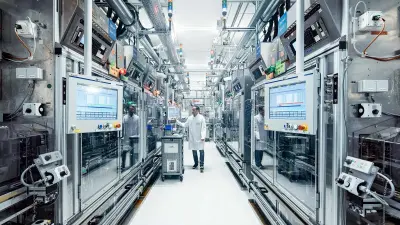
Combined with artificial intelligence, quality control of production processes in Industry 4.0 will offer many new possibilities in the long term. AI-based solutions such as the Bosch AI Analytics platform are already helping to find the causes of quality problems in the manufacture of a wide variety of products, thereby reducing follow-up work. This analysis solution was developed at the Bosch Center for Artificial Intelligence (BCAI) as part of Bosch Research. It is already in use on more than 1,400 Bosch production lines worldwide. This makes quality assurance, which used to be very costly, cheaper and faster. If defective parts were produced, correlation of the data can help to identify the cause and directly trigger troubleshooting. The AI can immediately determine whether a weld seam for example has turned out well and, in the event of a defect, identify the reason. As far as the finished product is concerned, the goal for Bosch and Bosch Research alike is zero-defect production during all the highly automated and connected manufacturing processes. In order to expand software-defined production even further, Bosch Research continues to research diligently — for new, even smarter AI solutions in tomorrow’s factories.
The world is changing, and automation technology allows and speeds up this transformation as a response to current and future challenges. Bosch Research is driving industrial automation and providing the stimulus for new developments.
